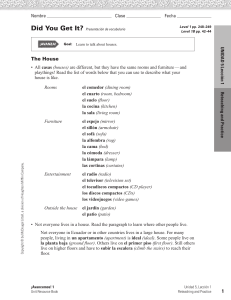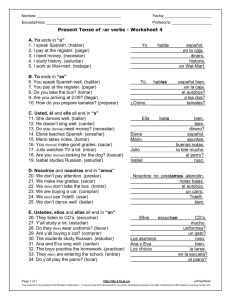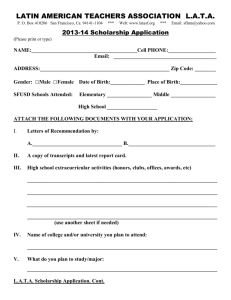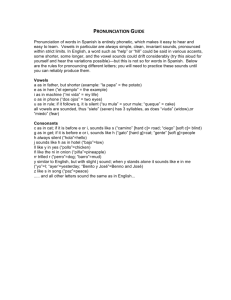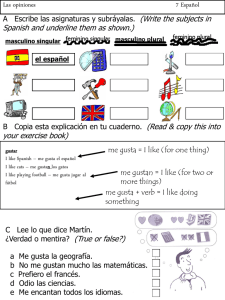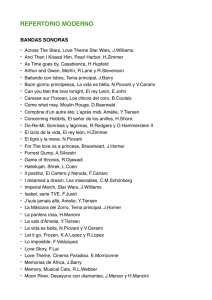1 Food and Drinks
advertisement
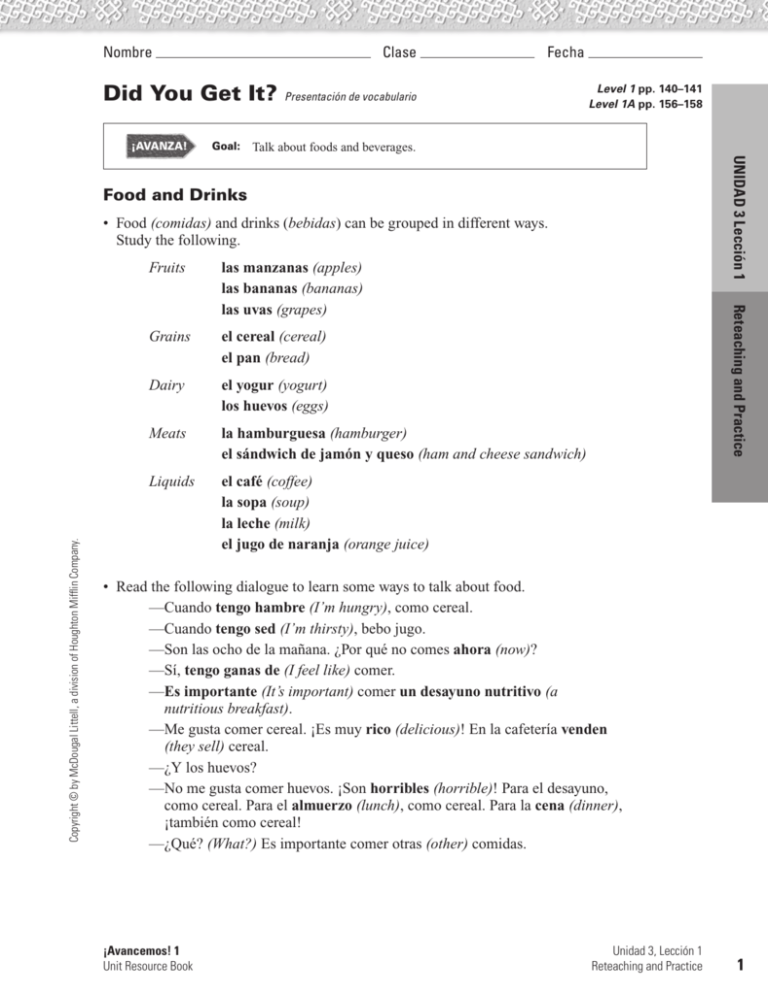
Nombre Clase Did You Get It? ¡AVANZA! Goal: Fecha Presentación de vocabulario Level 1 pp. 140–141 Level 1A pp. 156–158 Talk about foods and beverages. UNIDAD 3 Lección 1 Food and Drinks Fruits las manzanas (apples) las bananas (bananas) las uvas (grapes) Grains el cereal (cereal) el pan (bread) Dairy el yogur (yogurt) los huevos (eggs) Meats la hamburguesa (hamburger) el sándwich de jamón y queso (ham and cheese sandwich) Liquids el café (coffee) la sopa (soup) la leche (milk) el jugo de naranja (orange juice) Reteaching and Practice Copyright © by McDougal Littell, a division of Houghton Mifflin Company. • Food (comidas) and drinks (bebidas) can be grouped in different ways. Study the following. • Read the following dialogue to learn some ways to talk about food. —Cuando tengo hambre (I’m hungry), como cereal. —Cuando tengo sed (I’m thirsty), bebo jugo. —Son las ocho de la mañana. ¿Por qué no comes ahora (now)? —Sí, tengo ganas de (I feel like) comer. —Es importante (It’s important) comer un desayuno nutritivo (a nutritious breakfast). —Me gusta comer cereal. ¡Es muy rico (delicious)! En la cafetería venden (they sell) cereal. —¿Y los huevos? —No me gusta comer huevos. ¡Son horribles (horrible)! Para el desayuno, como cereal. Para el almuerzo (lunch), como cereal. Para la cena (dinner), ¡también como cereal! —¿Qué? (What?) Es importante comer otras (other) comidas. ¡Avancemos! 1 Unit Resource Book Unidad 3, Lección 1 Reteaching and Practice 1 Nombre Clase Did You Get It? Goal: Level 1 p. 142 Level 1A p. 159 Práctica de vocabulario Talk about foods and beverages. 1 Write the name of each item. la hamburguesa la sopa el cereal el pan los huevos la manzana la banana la leche 1. 2. 3. 4. 5. 6. 7. 8. 1. 5. 2. 6. 3. 7. 4. 8. Copyright © by McDougal Littell, a division of Houghton Mifflin Company. Reteaching and Practice UNIDAD 3 Lección 1 ¡AVANZA! Fecha 2 Which word does not belong in each group? 2 1. la manzana la uva el yogur la banana 2. el jugo de naranja el café la leche el pan 3. el desayuno la uva el almuerzo la cena 4. el cereal los huevos el jugo de naranja la hamburguesa 5. rico nutritivo horrible la sopa Unidad 3, Lección 1 Reteaching and Practice ¡Avancemos! 1 Unit Resource Book Nombre Clase Fecha 3 Choose a word from the box to complete each sentence. sed ganas ricas 1. Cuando tengo , como una banana. 2. Cuando tengo , me gusta beber leche. 3. Tengo 4. Me gustan las uvas. Son muy 5. No me gusta el yogur. Es horrible UNIDAD 3 Lección 1 hambre de comer una hamburguesa. . Reteaching and Practice . 4 Group the following into breakfast, lunch, and dinner foods and drinks. Some words can appear in more than one category. la sopa el yogur el cereal la hamburguesa los huevos el café el pan la leche las uvas las bananas el jugo de naranja las manzanas Copyright © by McDougal Littell, a division of Houghton Mifflin Company. El desayuno El almuerzo el sándwich de jamón y queso La cena 5 Complete the sentences describing what you like to eat and drink for breakfast and lunch. 1. Para el desayuno, me gusta comer y beber 2. . Para el almuerzo, me gusta comer y beber ¡Avancemos! 1 Unit Resource Book . Unidad 3, Lección 1 Reteaching and Practice 3 Nombre Clase Did You Get It? Goal: Level 1 p. 145 Level 1A p. 162 Presentación de gramática Talk about things you and other people like. Gusta vs. Gustan • When someone likes to do something, gustar + infinitive is used. For example, me gusta correr. (I like to run.) Read the following sentences. They illustrate another way to use the verb gustar. Singular subject Plural subject (A mí) Me gusta el yogur. (I like yogurt.) Me gustan los huevos. (I like eggs.) (A ti) Te gusta el yogur. (You like yogurt.) Te gustan los huevos. (You like eggs.) (A usted / él / ella) Le gusta el yogur. (You / he / she likes yogurt.) Le gustan los huevos. (You / he / she likes eggs.) (A nosotros/as) Nos gusta el yogur. (We like yogurt.) Nos gustan los huevos. (We like eggs.) (A vosotros/as) Os gusta el yogur. (You like yogurt.) Os gustan los huevos. (You like eggs.) (A ustedes / ellos / ellas) Les gusta el yogur. (You / they like yogurt.) Les gustan los huevos. (You / they like eggs.) EXPLANATION: The verb gustar means to like. However, its literal meaning is to please or to be pleasing to. In the above sentences, the subjects are el yogur and los huevos. (Yogurt pleases me / Yogurt is pleasing to me and Eggs please me / Eggs are pleasing to me.) The me, te, le, nos, os, and les describe to whom something is pleasing. In other words, the singular and plural forms of gustar match what is liked, not the person who likes it. • Read the dialogue to see how gustar is used in conversation. —Alicia, ¿te gusta la leche? (Alice, do you like milk?) —Sí, me gusta mucho. (Yes, I like it a lot.) —¿Y los jugos? ¿Te gustan los jugos? (And juices? Do you like juices?) —También me gustan. El jugo de naranja es muy nutritivo. (I like them, too. Orange juice is very nutritious.) —¿A tus amigos les gusta la leche? (Do your friends like milk?) —No, no les gusta la leche pero les gustan los jugos. (No, they don’t like milk, but they like juices.) —A mí y a mis amigos nos gustan la leche y los jugos. ¡A nosotros nos gusta todo! (My friends and I like milk and juices. We like everything!) 4 Unidad 3, Lección 1 Reteaching and Practice ¡Avancemos! 1 Unit Resource Book Copyright © by McDougal Littell, a division of Houghton Mifflin Company. Reteaching and Practice UNIDAD 3 Lección 1 ¡AVANZA! Fecha Nombre Clase Did You Get It? ¡AVANZA! Goal: Fecha Level 1 pp. 146–147 Level 1A pp. 163–165 Práctica de gramática Talk about things you and other people like. Modelo: ¿Te gusta el café? Sí, me gusta el café. ¿Te gusta el pan? 2. ¿Te gusta la sopa? 3. ¿Te gusta el desayuno? 4. ¿Te gusta la fruta? 5. ¿Te gusta el sándwich de jamón y queso? No, no me gusta el café. 2 What else do you like? Answer the following questions using the verb gustar. Copyright © by McDougal Littell, a division of Houghton Mifflin Company. Modelo: ¿Te gustan las uvas? Sí, me gustan las uvas. 1. ¿Te gustan las hamburguesas? 2. ¿Te gustan los huevos? 3. ¿Te gustan las bananas? 4. ¿Te gustan las manzanas? 5. ¿Te gustan los cereales? or No, no me gustan las uvas. Reteaching and Practice 1. or UNIDAD 3 Lección 1 1 What do you like? Answer the following questions using the verb gustar. 3 Complete each sentence with gusta or gustan. 1. Me la comida. 2. Les los huevos. 3. Te 4. Nos el desayuno. 5. Les las uvas. 6. Le el café. 7. Me las manzanas. 8. Te 9. Nos las hamburguesas. 10. Les la sopa. ¡Avancemos! 1 Unit Resource Book el café. el pan. Unidad 3, Lección 1 Reteaching and Practice 5 Nombre Clase Fecha UNIDAD 3 Lección 1 1. Me gusta el desayuno. 2. A ellos les gustan las uvas. 3. ¿Te gusta el café? 4. A ustedes les gusta el sándwich. 5. Nos gustan las frutas. 6. Te gusta la sopa. Reteaching and Practice 4 Translate these sentences into English. 7. Les gustan las manzanas. 8. A ella le gusta el jamón. 9. Me gustan los huevos. 10. A los chicos les gusta el yogur. 1. They like orange juice. 2. She likes cereal. 3. You (pl.) like milk. 4. We like yogurt. 5. I like grapes. 6. You (sing.) like bread. 7. He likes cheese. 8. They like eggs. 9. Does he like sandwiches? 10. Copyright © by McDougal Littell, a division of Houghton Mifflin Company. 5 Translate these sentences into Spanish. We like coffee. 6 Use the verb gustar to tell what foods your family, friends, and you like. 6 1. A mis padres... 2. A mis hermanos... 3. A mi amigo(a)... 4. A todos mis amigos... 5. A mí... Unidad 3, Lección 1 Reteaching and Practice ¡Avancemos! 1 Unit Resource Book Nombre Clase Did You Get It? ¡AVANZA! Goal: Fecha Level 1 p. 150 Level 1A p. 168 Presentación de gramática Learn to conjugate –er and –ir verbs. • Read the conjugations of the -er and -ir verbs. vivir (to live) vendo (I sell) vendes (you sell) vende (he or she / you sell(s)) vendemos (we sell) vendéis (you sell) venden (they / you sell) vivo (I live) vives (you live) vive (he or she / you live(s)) vivimos (we live) vivís (you live) viven (they / you live) EXPLANATION: The conjugation of -er and -ir verbs is the same except in the Reteaching and Practice yo tú él / ella / usted nosotros(as) vosotros(as) ellos(as) / ustedes vender (to sell) UNIDAD 3 Lección 1 Conjugating Regular -er and -ir Verbs nosotros and vosotros forms. Study the chart below. Use it as a quick reference to review and compare the conjugation of all three verb forms. Copyright © by McDougal Littell, a division of Houghton Mifflin Company. -ar -er -ir -o -amos -o -emos -o -imos -as -áis -es -éis -es -ís -a -an -e -en -e -en ¡Avancemos! 1 Unit Resource Book Unidad 3, Lección 1 Reteaching and Practice 7 Nombre Clase Did You Get It? Goal: Práctica de gramática Level 1 pp. 151–152 Level 1A pp. 169–171 Learn to conjugate –er and –ir verbs. 1 Write the correct form of correr based on the subject. 1. tú 2. ellos 3. usted 4. yo 5. Paco 6. ustedes 7. Ana 8. Andrés y yo 2 Write the correct form of escribir based on the subject. 1. los estudiantes 2. nosotros 3. ella 4. ustedes 5. tú 6. yo 7. usted 8. él Copyright © by McDougal Littell, a division of Houghton Mifflin Company. Reteaching and Practice UNIDAD 3 Lección 1 ¡AVANZA! Fecha 3 Complete each sentence with the correct form of the verb in parentheses. 1. Delia 2. Karen y yo 3. Ana todos los días. (correr) 4. Ellas mucha leche. (beber) 5. Tú 6. Emiliana 7. Rodrigo 8. Nosotros 9. Ellos 10. 8 Yo Unidad 3, Lección 1 Reteaching and Practice en los Estados Unidos. (vivir) paella. (comer) un libro. (leer) el desayuno. (compartir) inglés. (aprender) frutas. (comer) comida en la cafetería. (vender) en los Estados Unidos. (vivir) ¡Avancemos! 1 Unit Resource Book Nombre Clase Fecha 4 Form sentences using the words and expressions given. Follow the model. 1. Lucía y yo / aprender español / en la escuela 2. los chicos / correr / todos los días 3. ustedes / compartir una pizza / en la cafetería 4. tú / leer un libro / en la biblioteca 5. yo / escribir en el pizarrón / en clase 6. nosotros / comer un sándwich / para el almuerzo 7. ellos / vender fruta / en la cafetería 8. Alicia y Jorge / escribir correos electrónicos / en la computadora Reteaching and Practice Copyright © by McDougal Littell, a division of Houghton Mifflin Company. Andrés / beber jugo / para el desayuno Andrés bebe jugo para el desayuno. UNIDAD 3 Lección 1 Modelo: 5 Complete the sentences. Use each verb in the box at least once. beber comer compartir 1. Mi amigo 2. Mi amiga 3. Los directores 4. Todos mis amigos 5. Mi maestro(a) de español 6. Yo ¡Avancemos! 1 Unit Resource Book escribir leer vender vivir Unidad 3, Lección 1 Reteaching and Practice 9 Nombre Clase ¿Recuerdas? Fecha Level 1 pp. 32–33 Level 1A pp. 32–34 UNIDAD 3 Lección 1 • Read the following examples of using gustar + infinitive. Reteaching and Practice Gustar + infinitive Práctica ¿Te gusta hablar español? (Do you like to speak Spanish?) Sí, a mí me gusta hablar español. (Yes, I like to speak Spanish.) ¿A la maestra le gusta enseñar? (Does the teacher like to teach?) Sí, a ella le gusta enseñar. (Yes, she likes to teach.) 1. él / correr 2. usted / aprender español 3. yo / descansar 4. Miguel y yo / alquilar películas 5. las chicas / escribir correos electrónicos 6. mis amigos / andar en patineta 7. Amalia / pasar un rato con los amigos 8. tú / leer un libro 9. ustedes / compartir el almuerzo 10. 10 Copyright © by McDougal Littell, a division of Houghton Mifflin Company. Write sentences telling what each person likes to do. Modelo: ellas / comprar A ellas les gusta comprar. nosotros / hablar español Unidad 3, Lección 1 Reteaching and Practice ¡Avancemos! 1 Unit Resource Book Nombre Clase Fecha Level 1 p. 33 Level 1A pp. 33–34 ¿Recuerdas? Snack Foods la fruta las papas fritas la galleta el helado la pizza (fruit) (French fries) (cookie) (ice cream) (pizza) Las bebidas (Drinks) el agua el jugo el refresco (water) (juice) (soft drink) Reteaching and Practice Las comidas (Foods) UNIDAD 3 Lección 1 • Study the following words for snack foods. Práctica Copyright © by McDougal Littell, a division of Houghton Mifflin Company. 1 Write the name of these foods or drinks. 1. 2. 3. 4. 1. 4. 2. 5. 3. 6. 5. 6. 2 Name three of your favorite snacks. 1. 2. 3. ¡Avancemos! 1 Unit Resource Book Unidad 3, Lección 1 Reteaching and Practice 11 Nombre Clase Fecha ¿Recuerdas? The verb estar is used to say where a person or thing is. Yo estoy en la clase. Tú estás en la cafetería. Él (Ella, Usted) está en el gimnasio. I am in the classroom. You are in the cafeteria. He (She, You) is (are) in the gym. Nosotros estamos en la oficina. Ellos (Ellas, Ustedes) están en el pasillo. Vosotros (Vosotras) estáis en la biblioteca. We are in the office. They (You) are in the hall. You are in the library. EXPLANATION: The verb estar is another way to say to be. Use it to say where somebody is. Práctica 1 Complete the sentences using the correct form of estar. 1. Tú 2. Tus amigos 3. Usted 4. Ana y Rosita en la clase. en la clase. en la clase. en la clase. 5. Juan 6. Yo 7. Luis y yo clase. 8. Ustedes clase. en la clase. en la clase. en la en la Copyright © by McDougal Littell, a division of Houghton Mifflin Company. Reteaching and Practice UNIDAD 3 Lección 1 The Verb estar (to be) Telling time To say what time it is, use es or son. Es la una. Son las dos. Son las cuatro y diez. Son las ocho menos cinco. Son las nueve menos cuarto. Son las once y media. It is one o’clock. It is two o’clock. It is ten minutes past four. It is five minutes to eight. It is quarter to nine. It is eleven-thirty. EXPLANATION: To say it is one o’clock, use es. To say any other time, use son. To say it is some time after the hour, use y. To say it is some time before the hour, use menos. Cuarto means a quarter of an hour and media means half an hour. Práctica 1 Tell what time it is in each case. 12 1. (3:00) 4. (3:45) 2. (12:30) 5. (4:15) 3. (1:30) 6. (8:50) Unidad 3, Lección 1 Reteaching and Practice ¡Avancemos! 1 Unit Resource Book Nombre Clase Did You Get It? ¡AVANZA! Goal: Fecha Level 1 pp. 164–165 Level 1A pp. 184–186 Presentación de vocabulario Talk about family. la abuela los abuelos el abuelo los padres el padre la tía los tíos el tío la hija los hijos el hijo la prima los primos el primo la hermana los hermanos el hermano el perro el gato Reteaching and Practice la madre UNIDAD 3 Lección 2 The Family Copyright © by McDougal Littell, a division of Houghton Mifflin Company. • Study the names of the months (los meses) in Spanish. Then read the dialogue at the bottom to learn how to ask about the date. enero febrero marzo abril (January) (February) (March) (April) (May) (June) (July) (August) mayo junio julio agosto septiembre octubre noviembre diciembre (September) (October) (November) (December) —¿Cuál es la fecha de hoy? (What’s today’s date?) —Es el primero de enero. (It’s the first of January.) • Here are some more numbers (números). doscientos trescientos cuatrocientos quinientos seiscientos (200) (300) (400) (500) (600) setecientos ochocientos novecientos mil un millón (de) (700) (800) (900) (1000) (1,000,000 (of)) • Here are some ways to talk about how old someone is. —Yo tengo quince años. (I am 15 years old.) —¿Cuántos años tienes tú? (How old are you?) ¡Avancemos! 1 Unit Resource Book Unidad 3, Lección 2 Reteaching and Practice 13 Nombre Clase Did You Get It? Goal: Level 1 p. 166 Level 1A p. 187 Práctica de vocabulario Talk about family. 1 Who is . . . 1. 2. 3. 4. 5. 6. 7. 8. 9. 10. the family’s pet feline? el perro la familia el gato your father’s daughter? tu prima tu hermana tu abuela your father’s sisters? tus abuelos tus hermanas tus tías your uncle’s son? tu hermano tu padre tu primo your mother’s father? tu abuelo tu padre tu hermano your father’s son? tu prima tu hermano tu abuela your mother’s children? tus hermanos tus tías tus hijos the family’s pet canine? el gato el perro la familia your grandmother’s son? tu hijo tu padre tu hermano your aunt’s daughter? tu abuela tu tía tu prima Copyright © by McDougal Littell, a division of Houghton Mifflin Company. Reteaching and Practice UNIDAD 3 Lección 2 ¡AVANZA! Fecha 2 In which month . . . 14 1. is Valentine’s day? 2. does the New Year begin? 3. is Halloween? 4. is Independence Day? 5. does summer begin? Unidad 3, Lección 2 Reteaching and Practice ¡Avancemos! 1 Unit Resource Book Nombre Clase Fecha 3 Answer the questions in Spanish. Follow the model. ¿Quiénes son las hermanas de tu padre? Son mis tías. ¿Quién es el padre de tu madre? 2. ¿Quién es la hija de tu padre? 3. ¿Quién es la hija de tu tío? 4. ¿Quién es la madre de tu padre? 5. ¿Quiénes son los hijos de tu tía? Reteaching and Practice 1. UNIDAD 3 Lección 2 Modelo: 4 Answer these questions in Spanish. 1. ¿Cuál es la fecha de hoy? 2. ¿Cuántos hermanos tienes? 3. ¿Cuántos años tienen tus hermanos? 4. ¿Cuándo es el cumpleaños de tu hermano(a)? 5. ¿Cuántos años tienes tú? 6. ¿Cuándo es tu cumpleaños? Copyright © by McDougal Littell, a division of Houghton Mifflin Company. 5 Draw your family tree or a family tree of a famous family and label it in Spanish. ¡Avancemos! 1 Unit Resource Book Unidad 3, Lección 2 Reteaching and Practice 15 Nombre Clase Did You Get It? Goal: Level 1 p. 169 Level 1A p. 190 Presentación de gramática Learn about possessive adjectives. Possessive Adjectives • Number Agreement. Possessive adjectives describe a relationship between people or things. Read the following sentences, paying attention to the boldfaced words. Mi abuela tiene 60 años. Mis abuelos tienen 60 años. (My grandmother is 60 years old.) (My grandparents are 60 years old.) Tu padre tiene 40 años. Tus padres tienen 40 años. (Your father is 40 years old.) (Your parents are 40 years old.) Su tío tiene 35 años. Sus tíos tienen 35 años. (His or her / your / their uncle is 35 years old.) (His or her / your / their uncles are 35 years old.) EXPLANATION: In Spanish, possessive adjectives agree in number with the nouns they describe. They agree with what is possessed, not with the person who possesses it. • Gender Agreement. Read the sentences, paying attention to the boldfaced words. Nuestra madre es maestra. Nuestros padres son maestras. (Our mother is a teacher.) (Our parents are teachers.) Nuestro padre es maestro. Nuestras tías son maestras. (Our father is a teacher.) (Our aunts are teachers.) EXPLANATION: The adjectives nuestro and vuestro have both masculine and feminine forms. They agree in gender with the nouns they describe. Remember that they also agree in number. Study the following table and use it as a quick reference for possessive adjectives. Singular Possessive Adjectives 16 Plural Possessive Adjectives mi my nuestro(a) our mis my nuestros(as) our tu your (familiar) vuestro(a) your (familiar) tus your (familiar) vuestros(as) your (familiar) su your (formal) su your (formal) sus your (formal) sus your (formal) su his, her, its su their sus his, her, its sus their Unidad 3, Lección 2 Reteaching and Practice ¡Avancemos! 1 Unit Resource Book Copyright © by McDougal Littell, a division of Houghton Mifflin Company. Reteaching and Practice UNIDAD 3 Lección 2 ¡AVANZA! Fecha Nombre Clase Did You Get It? ¡AVANZA! Goal: Práctica de gramática Fecha Level 1 pp. 170–171 Level 1A pp. 191–193 Learn about possessive adjectives. UNIDAD 3 Lección 2 1 Match each English phrase with its corresponding Spanish phrase. sus zapatos your grandfather 2. su abuelo my cousin 3. mi escuela his shoes 4. mi primo our grandmother 5. nuestra abuela my school 6. mis zapatos your grandparents 7. tus abuelos my shoes Reteaching and Practice 1. Copyright © by McDougal Littell, a division of Houghton Mifflin Company. 2 Fill in the correct possessive adjectives. 1. libro (his) 2. padre (our) 3. abuelos (their) 4. primas (your, familiar sing.) 5. familia (your, familiar sing.) 6. primos (our) 7. gatos (my) 3 Write the appropriate possessive adjective for each sentence. 1. primo se llama Miguel. (our) 2. hermano es inteligente. (her) 3. tía es creativa. (my) 4. abuelo es serio. (her) 5. abuelos son mayores. (your, familiar sing., in L.A.) 6. calculadora está debajo del escritorio. (his) 7. lápiz es amarillo. (his) 8. mochilas son grandes. (their) ¡Avancemos! 1 Unit Resource Book Unidad 3, Lección 2 Reteaching and Practice 17 Nombre Clase Fecha José is my brother. 2. María is your sister. (your, formal) 3. Your dog’s name is Lacy. (your, familiar sing.) 4. Our grandfather’s birthday is January 4th. 5. Your uncle likes apples. (your, familiar sing.) 6. His grandfather’s name is José. 7. Our house is large. 8. Their parents work a lot. 9. My cat is pretty. 10. My aunt is a teacher. 5 Write a short paragraph describing your family or a friend’s family. Use as many possessive adjectives as you can. Modelo: Tengo dos hermanos. Mi hermano, Pablo, tiene diez años. Su cumpleaños es el primero de enero. Mi hermana, Alicia, tiene ocho años. Su cumpleaños es el cuatro de abril. 18 Unidad 3, Lección 2 Reteaching and Practice ¡Avancemos! 1 Unit Resource Book Copyright © by McDougal Littell, a division of Houghton Mifflin Company. UNIDAD 3 Lección 2 1. Reteaching and Practice 4 Translate the following sentences into Spanish. Nombre Clase Did You Get It? ¡AVANZA! Goal: Fecha Level 1 p. 174 Level 1A p. 196 Presentación de gramática Learn to compare things and people. EXPLANATION: Sometimes, we use an adjective to compare two things. The adjective agrees with the noun that comes before it. • Now read these sentences, paying attention to the boldfaced words. Me gusta ir a la cafetería más que (I like to go to the cafeteria more than al gimnasio. to the gym.) Me gustan las bananas menos que las fresas. (I like bananas less than strawberries.) Me gusta caminar tanto como correr. (I like to walk as much as run.) Reteaching and Practice • There are several phrases in Spanish used to make comparisons. Read the following sentences, paying attention to the boldfaced words and underlined letters. Álvaro es más simpático que Luis. (Álvaro is more pleasant than Luis.) Mónica es menos divertida que Carolina. (Mónica is less fun than Carolina.) Los chicos son tan serios como la maestra. (The boys are as serious as the teacher.) UNIDAD 3 Lección 2 Making Comparisons Copyright © by McDougal Littell, a division of Houghton Mifflin Company. EXPLANATION: Comparisons do not always include an adjective. • Now read these sentences, paying attention to the boldfaced words. Mi tía es mayor que mi tío. (My aunt is older than my uncle.) Mi madre es menor que mi padre. (My mother is younger than my father.) Mis abuelos son mayores que mis padres. (My grandparents are older than my parents.) EXPLANATION: There are a few irregular comparative words. Study the chart below and use it as a quick reference. Singular ¡Avancemos! 1 Unit Resource Book Plural older younger mayor menor mayores menores better worse mejor peor mejores peores Unidad 3, Lección 2 Reteaching and Practice 19 Nombre Clase Did You Get It? Reteaching and Practice UNIDAD 3 Lección 2 ¡AVANZA! Goal: Fecha Level 1 pp. 175–176 Level 1A pp. 197–199 Práctica de gramática Learn to compare things and people. 1 Complete the following sentences with que or como. 1. Julián es más organizado su vecino. 2. Matilde es tan inteligente su hermana. 3. Elena corre tanto 4. Pedro tiene más libros 5. Sara toca la guitarra mejor 6. Ricardo es tan trabajador José. su amigo. su hermano. su hermano. 2 Form sentences by matching the following. 1. Jorge es tan guapo... que su tía. 2. Alisa es más bonita... que las hamburguesas. 3. A ellos les gusta hablar tanto... como su hermano. 4. A mí me gusta la sopa menos... que estudiar. 5. Leer es más divertido... como escuchar. 1. 2. mi tía mi abuela los chicos Mónica las chicas 4. 5. Marco Alicia Marta Arturo 1. a. b. Mi tía es mayor que mi abuela. Mi tía es menor que mi abuela. 4. a. b. Marco es más alto que Arturo. Arturo es tan alto como Marco. 2. a. Las chicas son menos serias que los chicos. Las chicas son más serias que los chicos. 5. a. A Marta le gusta descansar más que correr. A Marta le gusta descansar menos que correr. b. 3. a. b. 20 3. b. Mónica es más estudiosa que Alicia. Alicia es tan estudiosa como Mónica. Unidad 3, Lección 2 Reteaching and Practice ¡Avancemos! 1 Unit Resource Book Copyright © by McDougal Littell, a division of Houghton Mifflin Company. 3 Choose the sentence that describes each picture. Nombre Clase Fecha 4 Write four sentences using some of the comparative expressions from the box. Follow the model. tan... como mayor(es) mejor(es) menos... que tanto... como menor(es) peor(es) Modelo: bananas / manzanas Me gustan las bananas más que las manzanas. hermano / padre 2. la clase de español / la clase de inglés 3. tú / tu amigo(a) 4. tus primos / tú Reteaching and Practice 1. UNIDAD 3 Lección 2 más... que 5 Translate the following sentences into Spanish using the correct form of the Copyright © by McDougal Littell, a division of Houghton Mifflin Company. comparative expression in parentheses. 1. Marcia is taller than Tomás. (más... que) 2. Delia is less studious than her sister. (menos... que) 3. The boys are as intelligent as the girls. (tan... como) 4. I like to go to the cafeteria more than to the gym. (más que) 5. My parents are older than my aunts and uncles. (mayor que) 6. The bananas are better than the grapes. (mejor que) 7. The soup is worse than the yogurt. (peor que) ¡Avancemos! 1 Unit Resource Book Unidad 3, Lección 2 Reteaching and Practice 21 Nombre Clase Fecha Level 1 p. 91 Level 1A p. 100 ¿Recuerdas? 22 • Review the conjugation of the verb tener (to have). Tener (to have) Singular yo tengo (I have) tú tienes (you have) usted tiene (you have) él tiene (he has) ella tiene (she has) Plural nosotros(as) tenemos (we have) vosotros(as) tenéis (you have) ustedes tienen (you have) ellos tienen (they have) ellas tienen (they have) Práctica Form sentences about age using the words and ages given. Follow the model. Modelo: la abuela / 58 La abuela tiene cincuenta y ocho años. 1. el abuelo / 70 2. sus padres / 45 3. su hermano menor / 9 4. Alejandro y yo / 18 5. yo / 16 Unidad 3, Lección 2 Reteaching and Practice Copyright © by McDougal Littell, a division of Houghton Mifflin Company. Reteaching and Practice UNIDAD 3 Lección 2 The verb tener ¡Avancemos! 1 Unit Resource Book Nombre Clase Fecha Level 1 p. 87 Level 1A p. 94 ¿Recuerdas? Numbers from 11 to 100 11 12 13 14 15 16 17 18 19 veinte veintiuno veintidós veintitrés veinticuatro veinticinco veintiséis veintisiete veintiocho veintinueve 20 21 22 23 24 25 26 27 28 29 treinta treinta y uno cuarenta cincuenta sesenta setenta ochenta noventa cien 30 31 40 50 60 70 80 90 100 Reteaching and Practice once doce trece catorce quince dieciséis diecisiete dieciocho diecinueve UNIDAD 3 Lección 2 • Study the numbers from 11 to 100. Práctica Copyright © by McDougal Littell, a division of Houghton Mifflin Company. Solve the math problems in Spanish. 1. 22 – 10 = 2. 32 + 8 = 3. 22 × 2 = 4. 60 ÷ 2 = 5. 45 – 3 = 6. 50 + 10 = 7. 64 + 36 = 8. 95 – 5 = 9. 25 + 12 = 10. 75 × 1 = 11. 100 ÷ 2 = 12. 56 – 34 = 13. 22 × 3 = 14. 32 – 14 = 15. 98 – 17 = ¡Avancemos! 1 Unit Resource Book Unidad 3, Lección 2 Reteaching and Practice 23 Nombre Clase ¿Recuerdas? Fecha Level 1 pp. 32–33 Level 1A pp. 32–34 Reteaching and Practice UNIDAD 3 Lección 2 After-school activities • Read the after-school activities listed below. correr (to run) escribir correos electrónicos (to write emails) escuchar música (to listen to music) hacer la tarea (to do homework) leer libros (to read books) mirar la televisión (to watch television) pasar un rato con los amigos (to spend time with friends) pasear (to go for a walk) practicar deportes (to play sports) preparar la comida (to prepare food / a meal) tocar la guitarra (to play the guitar) trabajar (to work) Which activity would the following people most likely do based on the descriptions? Some people may do more than one activity. Follow the model. Modelo: Elena es estudiosa. Ella lee libros. 24 1. El padre de Arturo es trabajador. 2. La hermana de Andrea es perezosa. 3. Los chicos son atléticos. 4. Luis no es perezoso. 5. Ana y Enrique son simpáticos. Unidad 3, Lección 2 Reteaching and Practice ¡Avancemos! 1 Unit Resource Book Copyright © by McDougal Littell, a division of Houghton Mifflin Company. Práctica Did You Get It? Answer Key PRÁCTICA DE GRAMÁTICA Food and Drinks, pp. 2–3 Gusta vs. Gustan, pp. 5–6 1 1 1. 3. 5. 7. la manzana el cereal la sopa los huevos 2. 4. 6. 8. la hamburguesa el pan la leche la banana 5. el yogur la uva la sopa 2. 4. el pan la hamburguesa 4. 5. 3 1. 2. 3. 4. 5. hambre sed ganas ricas horrible Copyright © by McDougal Littell, a division of Houghton Mifflin Company. 4 Answers will vary. Possible answers: 2 1. 2. 3. la sopa: el almuerzo, la cena la hamburguesa: el almuerzo, la cena el café: el desayuno 4. 5. los huevos: el desayuno el yogur: el desayuno las uvas: el desayuno, el almuerzo el pan: el almuerzo, la cena Sí, me gusta el pan. / No, no me gusta el pan. Sí, me gusta la sopa. / No, no me gusta la sopa. Sí, me gusta el desayuno. / No, no me gusta el desayuno. Sí, me gusta la fruta. / No, no me gusta la fruta. Sí, me gusta el sándwich de jamón y queso. / No, no me gusta el sándwich de jamón y queso. Sí, me gustan las hamburguesas. / No, no me gustan las hamburguesas. Sí, me gustan los huevos. / No, no me gustan los huevos. Sí, me gustan las bananas. / No, no me gustan las bananas. Sí, me gustan las manzanas. / No, no me gustan las manzanas. Sí, me gustan los cereales. / No, no me gustan los cereales. Reteaching and Practice Answer Key 3. 2. 3. 2 1. 1. UNIDAD 3 Lección 1 PRÁCTICA DE VOCABULARIO 3 1. 3. 5. las bananas: el desayuno, el almuerzo 7. el cereal: el desayuno 9. gusta gusta gustan gustan gustan 2. 4. 6. 8. 10. gustan gusta gusta gusta gusta las manzanas: el desayuno, el almuerzo la leche: el desayuno el almuerzo el sándwich de jamón y queso: el almuerzo, la cena el jugo de naranja: el desayuno 5 Answers will vary. ¡Avancemos! 1 Unit Resource Book Unidad 3, Lección 1 Reteaching and Practice Answer Key 25 Did You Get It? Answer Key 1. 2. 3. 4. 5. 6. 7. Reteaching and Practice Answer Key 8. 9. 10. 3 I like breakfast. They like grapes. Do you like coffee? You like the sandwich. We like fruit. You like soup. You like apples. She likes ham. I like eggs. The boys like yogurt. 1. 3. 5. 7. 9. 2. 3. 4. 5. 6. 7. 8. 9. 10. 1. 2. 3. 4. Les gusta el jugo de naranja. Le gusta el cereal. Os/Les gusta la leche. Nos gusta el yogur. Me gustan las uvas. Te/Le gusta el pan. Le gusta el queso. Les gustan los huevos. ¿Le gustan los sándwiches? Nos gusta el café. 5. 6. 7. 8. 4. 1. 2. 3. 7. 4. 5. 8. 3. 6. corre corren 4. 7. 26 5. 6. 2 1. escriben escriben escribe 2. 5. 8. escribimos escribes escribe Unidad 3, Lección 1 Reteaching and Practice Answer Key 10. Lucía y yo aprendemos español en la escuela. Los chicos corren todos los días. Ustedes comparten una pizza en la cafetería. Tú lees un libro en la biblioteca. Yo escribo en el pizarrón en clase. Nosotros comemos un sándwich para el almuerzo. Ellos venden fruta en la cafetería. Alicia y Jorge escriben correos electrónicos en la computadora. Práctica 1 corren corre corremos 8. Gustar + infinitive, p. 10 Conjugating Regular -er and -ir Verbs, pp. 8–9 2. 6. ¿RECUERDAS? PRÁCTICA DE GRAMÁTICA corres corro corre 4. comemos beben comparte comemos vivo 5 Answers will vary. 6 Answers will vary. 1. 2. 4 5 1. vive corre lees aprende venden 3. 6. escribe escribo A él le gusta correr. A usted le gusta aprender español. A mí me gusta descansar. A Miguel y a mí nos gusta alquilar películas. A las chicas les gusta escribir correos electrónicos. A mis amigos les gusta andar en patineta. ¡Avancemos! 1 Unit Resource Book Copyright © by McDougal Littell, a division of Houghton Mifflin Company. UNIDAD 3 Lección 1 4 Did You Get It? Answer Key 7. 9. 10. ¿RECUERDAS? Snack Foods, p. 11 ¿RECUERDAS? The Verb estar (to be), Telling Time, p. 12 1 1. 2. 3. 4. 1 2. 2. 3. 4 5. 6. 6. 7. 8. está estoy estamos están 3. 4. 5. 6. Son las tres. Son las doce y media. Es la una y media. Son las cuatro menos cuarto. Son las cuatro y cuarto. Son las nueve menos diez. Reteaching and Practice Answer Key 1. el helado la galleta el jugo de naranja las papas fritas la pizza la fruta 5. 2 Práctica 1. estás están está están UNIDAD 3 Lección 1 8. A Amalia le gusta pasar un rato con los amigos. A ti te gusta leer un libro. A ustedes les gusta compartir el almuerzo. A nosotros nos gusta hablar español. Copyright © by McDougal Littell, a division of Houghton Mifflin Company. 2 Answers will vary. ¡Avancemos! 1 Unit Resource Book Unidad 3, Lección 1 Reteaching and Practice Answer Key 27 PRÁCTICA DE VOCABULARIO PRÁCTICA DE GRAMÁTICA The Family, pp. 14–15 Possessive Adjectives, pp. 17–18 1 1 1. 3. 5. 7. 9. el gato tus tías tu abuelo tus hermanos tu padre 2. 4. 6. 8. 10. tu hermana tu primo tu hermano el perro tu prima 2. 3. 4. 5. febrero enero octubre julio junio 2. 3. 4. 5. Es mi abuelo. Es mi hermana. Es mi prima. Es mi abuela. Son mis primos. 4 1. 2. 3. 4. 5. 6. 3. 4. 5. 7. sus zapatos—his shoes su abuelo—your grandfather mi escuela—my school mi primo—my cousin nuestra abuela—our grandmother mis zapatos—my shoes tus abuelos—your grandparents 2 1. 3. 5. 7. 3 1. 2. 6. 2 1. 1. su sus tu mis 2. Nuestro Mi Tus Su 2. 4. 6. nuestro tus nuestros 3 1. 3. 5. 7. 4. 6. 8. Su Su Su Sus 4 Hoy es el... Tengo... Mi hermano mayor tiene... El cumpleaños de mi hermano(a) es el... Tengo... Mi cumpleaños es el... 5Answers will vary. 1. 2. 3. 4. 5. 6. 7. 8. 9. 10. José es mi hermano. María es su hermana. Tu perro se llama Lacy. El cumpleaños de nuestro abuelo es el 4 de enero. A tu tío le gustan las manzanas. Su abuelo se llama José. Nuestra casa es grande. Sus padres trabajan mucho. Mi gato es bonito. Mi tía es maestra. 5Answers will vary. 28 Unidad 3, Lección 2 Reteaching and Practice Answer Key ¡Avancemos! 1 Unit Resource Book Copyright © by McDougal Littell, a division of Houghton Mifflin Company. Reteaching and Practice Answer Key UNIDAD 3 Lección 2 Did You Get It? Answer Key Did You Get It? Answer Key PRÁCTICA DE GRAMÁTICA ¿RECUERDAS? The Verb tener, p. 22 1 Práctica 1. 4. que que 2. 5. como que 3. 6. como como 2 1. 2. 4. 5. 3. Jorge es tan guapo... como su hermano. Alisa es más bonita... que su tía. A ellos les gusta hablar tanto... como escuchar. A mí me gusta la sopa menos... que las hamburguesas. Leer es más divertido ... que estudiar. Mi tía es menor que mi abuela. b. Las chicas son más serias que los chicos. a. Mónica es más estudiosa que Alicia. a. Marco es más alto que Arturo. a. A Ana le gusta descansar más que correr. 1. b. 4. 5. Copyright © by McDougal Littell, a division of Houghton Mifflin Company. 6. 4 Answers will vary. 5 1. 2. 3. 4. 5. 6. 7. 4. 5. ¿RECUERDAS? Numbers from 11 to 100, p. 23 Práctica 1. 2. 3 2. 2. Marcia es más alta que Tomás. Delia es menos estudiosa que su hermana. Los chicos son tan inteligentes como las chicas. Me gusta ir a la cafetería más que al gimnasio. Mis padres son mayores que mis tíos. Las bananas son mejores que las uvas. La sopa es peor que el yogur. ¡Avancemos! 1 Unit Resource Book El abuelo tiene setenta años. Sus padres tienen cuarenta y cinco años. Su hermano menor tiene nueve años. Alejandro y yo tenemos dieciocho años. Yo tengo dieciséis años. 3. 4. 5. 6. 7. 8. 9. 10. 11. 12. 13. 14. 15. doce cuarenta cuarenta y cuatro treinta cuarenta y dos sesenta cien noventa treinta y siete setenta y cinco cincuenta veintidós sesenta y seis dieciocho ochenta y uno Unidad 3, Lección 2 Reteaching and Practice Answer Key Reteaching and Practice Answer Key 3. 1. UNIDAD 3 Lección 2 Making Comparisons, pp. 20–21 29 Did You Get It? Answer Key After-school Activities, p. 24 Práctica 1 1. 2. 3. 4. 5. Él trabaja mucho. Ella descansa mucho. Ella mira mucho la televisión. Ellos practican deportes. Ellos corren. Él trabaja mucho. / Él lee libros. / Él hace la tarea. / Practica deportes. Ellos pasan un rato con los amigos. / Ellos escriben correos electrónicos. Copyright © by McDougal Littell, a division of Houghton Mifflin Company. Reteaching and Practice Answer Key UNIDAD 3 Lección 2 ¿RECUERDAS? 30 Unidad 3, Lección 2 Reteaching and Practice Answer Key ¡Avancemos! 1 Unit Resource Book
